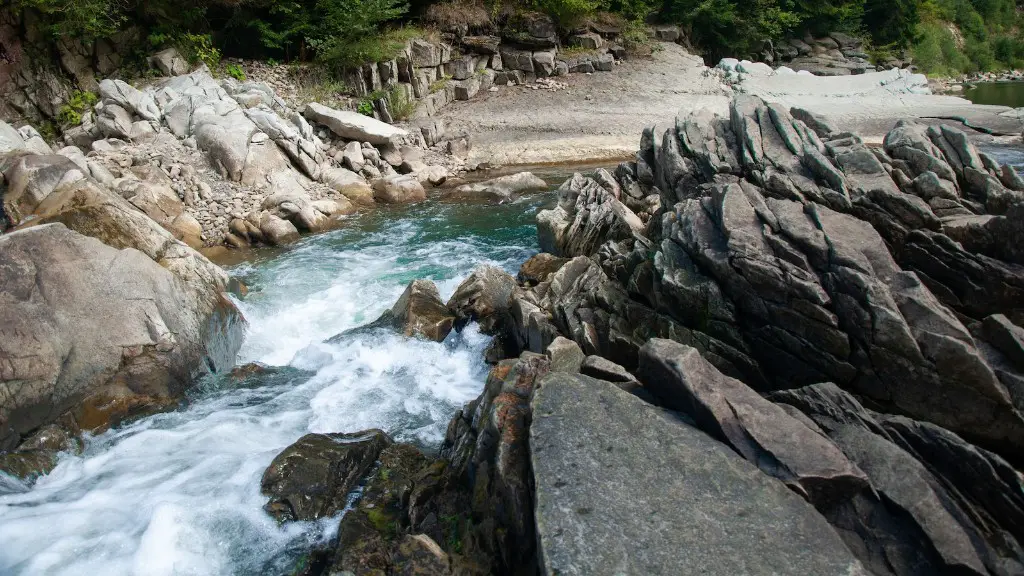The Mississippi River has been an integral part of the history, economics and culture of New Orleans since the city’s founding in 1718. It has served as a trade route, water source and lifeline to the sea, and provided an entrance to the Gulf of Mexico, helping to make New Orleans one of the most important seaports in the world. In many ways, the importance of the Mississippi River to New Orleans can be summed up in three words: commerce, transportation and recreation.
As a trade route, the Mississippi has facilitated the exchange of goods between the north and south of the United States. For over two centuries, goods have traversed up and down the Mississippi, bringing raw materials, manufactured goods and cultural exchange in their wake. This trading has been a major driver of the city’s economy, and has helped to establish New Orleans’ reputation as a cosmopolitan and vibrant port city.
The river has also provided New Orleans with much-needed water. It has been used to irrigate farms, to top up the city’s waterways, and to provide fresh drinking water for the population. Its importance to the region was recently highlighted in the aftermath of Hurricane Katrina, when it was used to replace the city’s contaminated drinking water supply.
Finally, the Mississippi River has long been an important source of recreation and leisure in New Orleans. Its banks are a popular spot for outdoor activities such as walking, fishing and boating. The river is also home to a rich array of wildlife, from the state’s rarest birds to playful river otters. The Mississippi also hosts some of the most famous tourist attractions in the city, from the mighty Riverwalk along its banks to the historic Café du Monde near the French Quarter.
By providing access to the Gulf of Mexico, the Mississippi River enabled New Orleans to establish itself as a major trading city and seafaring port. Its waters provided the city with a wealth of resources, from food and water to recreation. Still today, the Mississippi River is an integral part of the city, providing an important link to the past and an avenue to the sea.
Reconnecting to the River
In recent years, the Mississippi River has seen a resurgence of interest from both citizens and businesses. Public organizations, like Restore the Mississippi River Delta, have sought to reconnect the region to the Mississippi River by advocating for water quality improvements and coastal restoration. Private companies have also stepped in to support the river’s revitalization, from launching eco-tourism initiatives to building green infrastructure along its banks.
The city of New Orleans is also embarking on a new mission to re-establish the Mississippi as a functional and enjoyable part of the city. The city is looking to revive its waterfront parks, build boardwalks and promenades, and expand recreational fishing opportunities. The Riverfront Development Initiative is also underway, looking to revitalize the East and West banks of the Mississippi. This ambitious project involves the creation of green landscaping, infrastructure improvements and pedestrian access, helping to reconnect locals to their river and make the city’s waterfront a desirable place to live, work and play.
The importance of the Mississippi River to New Orleans goes far beyond its historical, economic and environmental virtues. To many, it represents hope, opportunity, and a reminder of the city’s past. As the city continues its quest to reconnect to the river, it is clear that the Mississippi will remain an essential part of New Orleans for decades to come.
Role of Technology
Nowadays, the Mississippi River is in the process of another transformation. Technology is playing a crucial role in the river´s future as river data and sensing technology allow a better understanding of its complex dynamics. Thus, generating deeper insights into the physical and ecological behavior of the river. Through the use of artificial intelligence techniques and real-time data streams, we now have the ability to track, monitor and predict its evolution in unprecedented detail.
This technology is proving to be a major asset in the maintenance of the river’s health. The ability to measure its water quality and keep track of biotic changes helps to keep the city informed on potential impacts of river contaminants and to make sound decisions. Ultimately, this technology can help to better inform communities as they look to remake their relationship with the Mississippi River.
Additionally, the use of space technologies are helping to better understand the global impacts of the Mississippi River. From predicting extreme flooding to increasing environmental monitoring, these tools have enabled New Orleans to better adapt to the changing climate. The data and insights provided by satellites can help to improve the city’s management of water resources, its response to flooding, and its decision-making processes.
Finally, the Mississippi River is also a platform for the exploration of new technologies and collaborative models. From robotics to augmented reality, the possibilities are endless when it comes to enhancing the understanding and enjoyment of our river. Through these advances, the relationship between people and water is evolving in new and fascinating ways.
Environmental Impacts
The environmental consequences exerted by the Mississippi River are enormous. Apart from being a provider of water, energy and food, the Mississippi is a critical habitat for fish, shellfish, and waterfowl species. Its wide range of habitats and resources are essential for the conservation of wildlife. Unfortunately, the now-ubiquitous use of fertilizers, herbicides and other pollutants in agricultural and urban activities has been steadily degrading the quality of the water in the Mississippi.
The long-term effects of this pollution threaten both the local environment and the livelihoods of those who rely on its resources. As a result, there has been an increased focus on improving water quality in the Mississippi. Organizations like WRI have been doing important work to restore the health of the river and its tributaries, while agencies such as the US EPA have established preventive measures to combat its pollution.
The added focus of local, federal and private stakeholders towards improving the health of the Mississippi River is to be commended. However, it is only by engaging citizens, businesses, and decision makers that sustainable solutions can be implemented in order to achieve the desired results. Education and awareness campaigns have been essential in raising the profile of the river’s plight and of those affected by its decline.
Local Knowledge
Much of the knowledge related to the Mississippi River has historically been passed down from generations of local communities. Fishers, farmers, hunters and gatherers, have all contributed to an intricate knowledge system about the river’s ecosystems and their associated resources. This traditional knowledge is playing a vital role in forming our understanding of the fields of ecology, geology, hydrology and biology, and in developing solutions to address the river’s ecological decline.
Preserving these cultural values is essential in creating meaningful relationships with the Mississippi. Empowering communities to continue their ecological traditions and knowledge is a key part of this process, and is helping to nurture a culture that is rooted in the relationship between people and their environment. This is no simple task, and requires a combination of leading-edge technologies and traditional practices in order to create holistic solutions.
New funding initiatives and scientific collaborations are helping to connect the efforts of local communities and international organizations, increasing the amount of resources available for tackling river health problems. While there is still much progress to be made, the Mississippi is slowly but surely regaining its previous reputation as one of the best places to explore, enjoy and experience.
Economic Impacts
The Mississippi River is a major economic engine for New Orleans and the state of Louisiana. As the largest shipping port in the US, the port of New Orleans supports businesses across multiple sectors including, oil & gas, mining, and agriculture. The river is also home to a number of tourism activities, bringing visitors to experience its spectacular scenery and hospitality.
The environmental health of the river is of paramount importance to the economic vitality of the region. Pollution, for example, is a major contributor to the economic impact of the Mississippi, as degraded water leads to dangerous algal blooms and decreased recreation opportunities. Poorly managed nutrient runoff from agricultural activities can also contribute to the disruption of the river’s delicate natural balance.
The importance of the river’s economic functions are further illustrated by its role in international trade. From 1803 to 1970, the Mississippi was used for exporting many of the country’s staple crops such as rice, corn and wheat. This activity continues today through the network of ports and terminals located along the river’s banks. The money generated from the movement of goods can sometimes exceed the GDP of entire countries, illustrating its importance in the global economy.
The economic impact of the Mississippi River can no longer be overlooked. By understanding the critical importance of the river to the regional economy and its link to international trade, we can begin to formulate meaningful solutions to its environmental challenges. Investing in initiatives such as river revitalization, technology, and local knowledge are integral parts of restoring its beauty and vitality, and ensuring its future as an economic driver.





